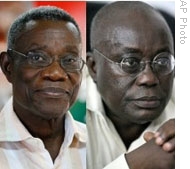voa标准英语2008-Tight Ghana Presidential Goes to Runoff(在线收听)
 |
| Ghana's opposition party candidate John Atta Mills (l) and Ruling party presidential candidate Nana Akufo-Addo in Accra, 09 Dec 2008 |
Ghana's Electoral Commission announced the governing party's Nana Akufo-Addo received 49 percent of the vote while the opposition's John Atta-Mills received 47 percent.
Because neither candidate received a 50 percent majority, the two veteran politicians will face each other in a runoff election in three weeks.
It was one of the closest presidential races in the country's 50-year history and was closely followed by Ghanaians on radio and television.
Akufo-Addo campaigned on continuity, promising to continue the cautious, pro-economic growth policies of outgoing President John Kuffuor and his New Patriotic Party.
Professor Vladimir Antwi-Danso of the Legon Center for International Affairs, says the elections showed Ghanaian politics are maturing.
"The electorate is becoming a little bit more discerning," he said. "But it looks as though while the incumbent was riding on their [party's] achievements, the opposition tried to show that the achievements were not reflected in the pockets of the individual."
He says the governing party suffered some loss of support due to the rise in prices for food and petroleum and shortages of electrical power and water.
As a result, it no longer dominates the parliament.
Antwi-Danso says Ghana's next president will have to build alliances with smaller parties in order to pass legislation. "It looks like a hung parliament for the future. I believe it is good for our democracy because parliament will have to be built on consensus, and is good for democracy," he said.
Antwi-Danso says one unfortunate aspect of the election was that some candidates made ambitious promises that will be difficult to fulfill without abandoning the prudent economic polices of the outgoing government.
"In our young democracies, what happens is appeals to people's stomachs, pockets, become more appealing," he said. "But then those promises cannot be fulfilled."
He notes that Ghana recently negotiated a reduction of its foreign debt by more than half. And the discovery of important off-shore oil reserves is expected to provide new revenues to the government in two years.
But experts caution that only solid economic growth can bring the sustained revenues needed to improve social programs. And they say vigilance must be maintained that the revenue windfall is not diverted into the pockets of corrupt officials.